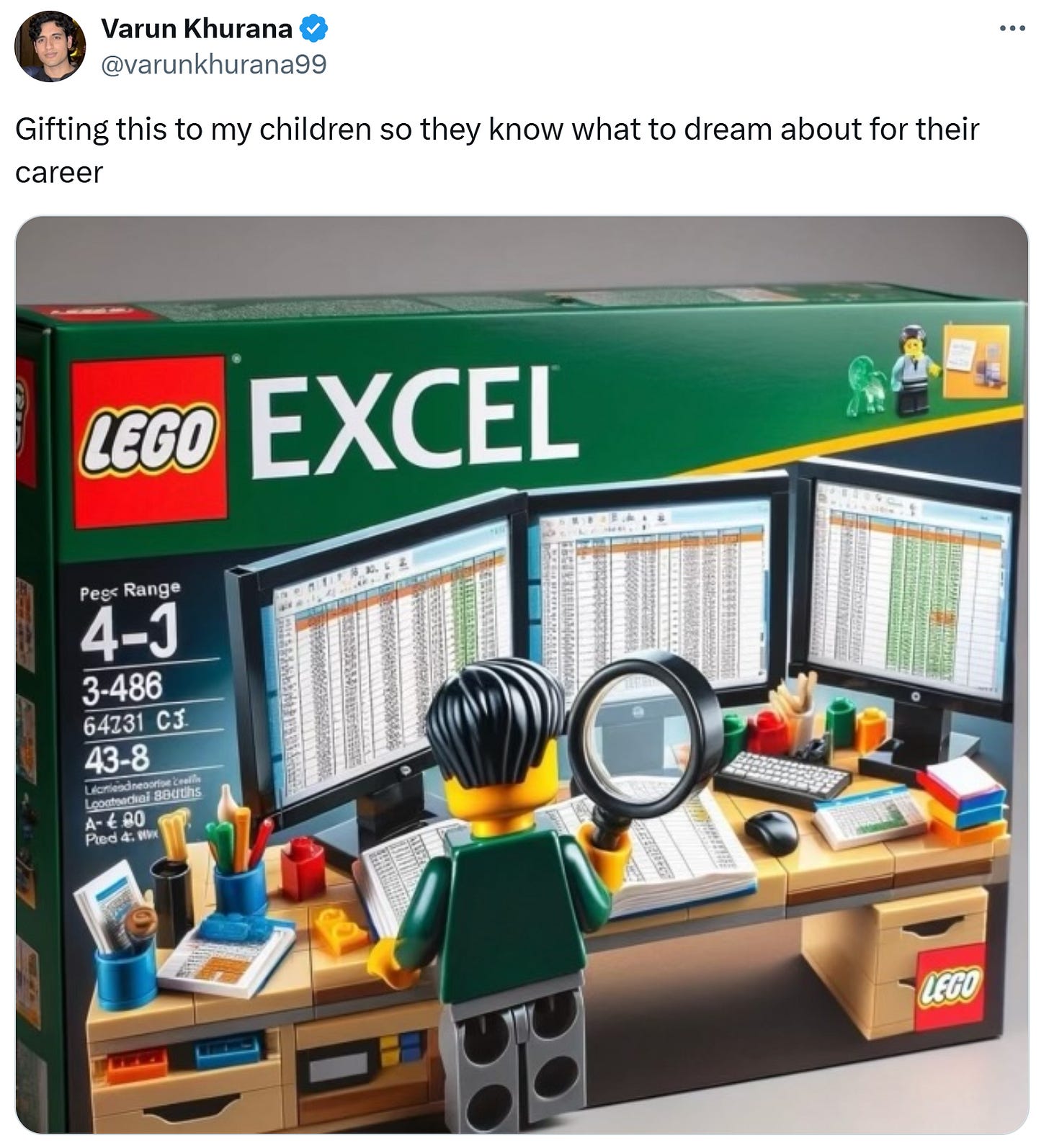No more sheep dipping your managers
Adaptive learning for managers: The problem and the promise.
We’ve talked about ‘adaptive learning’ a few times over the last year, both here in The L&D Dispatch and on The Mind Tools L&D Podcast (with Roy de Vries). Two weeks ago, I referenced Insights Media’s excellent report on adaptive learning.
Those references have sparked questions, from readers and from existing clients, about what ‘adaptive learning’ actually is. So I thought it might be fun, this week, to do a quick explainer.
First, let’s start with the problem: You have a diverse management population, with varying levels of skill and experience. Some are great, some are rubbish. You know that managers are vital to your organization’s success, and you want to make sure that all of your managers are equipped to succeed.
😱 How did you get here?
The root cause of this problem stems from how most organizations pick their managers in the first place.
As stated by writer Ed Zitron in The Atlantic:
‘Management has become a title rather than a discipline. We have a glut of people in management who were never evaluated on their ability to manage before being promoted to their role.’
I hear this complaint from almost every client I speak to: Our managers are good people, technically skilled, and with years of experience. But they weren’t promoted for their people skills.
Instead, the organization promoted them because they were the most effective individual contributor, or because they pushed for a promotion to get the higher pay that comes with a ‘manager’ title.
🧐 What do you do about it?
The common response from L&D professionals is to run some form of management development program.
Option 1 is to run an off-site. We take our managers to a swanky venue, where they sit through a mixture of presentations and group activities.
The advantage of this approach is that people usually enjoy it and make new contacts.
The disadvantages are that they are expensive, take the manager away from their day job, and aren’t available all year-round. The manager promoted today might wait months or even years before the next off-site becomes available.
Option 2 is to provide a digital content library. Managers can select from a suite of e-learning courses or resources that help them build their skills.
The advantage of these is that they are lower cost and always available.
The disadvantages are that they require that the manager can identify their own skill gaps, and remains sufficiently motivated to continue completing courses even when wading through content that they’re already familiar with.
Option 3 is to offer a blended program. This combines face-to-face or virtual sessions with self-paced digital content, usually delivered in some form of pathway.
The advantage of this approach is that it combines the best of options 1 and 2.
The disadvantages are that it requires someone (usually you, the L&D person) to administer the program, and that participants often have to proceed at the pace of the slowest learner.
🔍What these options have in common
Don’t misunderstand, all of these solutions can build management capability. In fact, the team here at Mind Tools have won awards for variations on these approaches.
But they tend to take a ‘sheep dip’ approach to learning: every manager is exposed to the same content and experiences, no matter their existing level of capability or skill.
Then, of course, there’s the fourth option: Just don’t give managers any support at all. Let them work it out.
The advantages of this approach are that it’s free and requires zero effort. The disadvantages are obvious.
Unfortunately, option four reflects the experience of 50% of the managers surveyed for our ‘Building Better Managers’ report.
When we measured their capability, we found that these ‘never supported’ managers were worse at coaching, goal setting, providing guidance, active listening and establishing trust than managers who had received support.
💡The promise of adaptive learning
What all of these approaches have in common is that they are ‘one size fits all’.
Adaptive learning changes all that.
Every manager is given a unique learning experience that acknowledges their existing capability, identifies gaps, and then fills those gaps with targeted content.
The team here at Mind Tools Towers are in the middle of building our adaptive learning product, Manager Skill Builder, right now. And so here’s a quick example of how it works:
Step One: Identifying the skills that managers need
Our ‘Building Better Managers’ report outlines the 12 skills that we know make a difference to individual, team and organizational performance. We’ve focused our Manager Skill Builder on these.
Step Two: Self-assessment
The manager accesses our Skill Builder and is given a course on, for example, coaching. They are asked how good they are at coaching, at present, and can rate themselves from ‘novice’ to ‘expert’.
A novice will be presented primarily with learning content. An expert will be presented primarily with formative questions.
Step Three: The learning experience
Now the manager gets into the content. The experience is tailored based on their self-assessment, but follows a consistent approach: The manager is asked a question, then asked how confident they are in their answer.
Suppose the manager gets a question correct, and says they are very confident. Our algorithm identifies that they have demonstrated expertise.
But suppose they get the question wrong, and say that they are very confident. Not only are they wrong, but our algorithm identifies that they are too confident about the wrong answer and that remediation is required.
Step Four: Ongoing assessment
This is where the magic happens. The adaptive algorithm is taking the results of the manager’s self-assessment, their answers to questions, and their stated confidence level, and providing them with a completely individualized learning experience.
As outlined in Insights Media’s adaptive learning report, that leads to:
tailored content (for every manager)
increased engagement (quickly skip through familar material)
efficient use of time (no more wasted time)
continuous assessment (and, therefore, feedback)
scalability (no waiting around for that off-site)
improved ROI (reduced time spent learning, with better learning outcomes)
spaced learning (the algorithm leverages learning science with refresher questions)
data-driven insights (our learning design team can see where learners are getting stuck and make enhancements to the program).
Know more than they think? The algorithm recognizes this and moves the manager quickly through the course.
Know less than they think? The algorithm recognizes this too, and helps build their capability until the skills gap is filled.
Adaptive learning won’t make them an expert. Like all skills, management needs to be practiced over time.
But it’s the best, most personalised start a new manager can have.
Coming soon!
We’ll be releasing our Manager Skill Builder product in the new few months. If you want to find out more, just reply to this email (or email custom@mindtools.com) and I’ll get in touch so we can have a chat.
🎧 On the podcast
Measuring management capability is intrinsically complex. Unlike sales training, where you have sales, or customer-service training, where you have CSAT scores, management doesn’t have a built-in metric we can use to quantify learning impact.
So, what’s the solution?
Last week on The Mind Tools L&D Podcast, my pal Ross Dickie was joined by Owen and Anna to discuss our new ‘Manager Skills Assessment’ — a scientific diagnostic that managers and their organizations can use to evaluate their capability.
The team discussed:
what the Manager Skills Assessment (MSA) is, and how it works;
how we designed the MSA based on scientific research;
what managers and L&D teams can expect to get out of the MSA.
Check out the episode below. 👇
You can subscribe to the podcast on iTunes, Spotify or the podcast page of our website. Want to share your thoughts? Get in touch @RossDickieMT, @RossGarnerMT or #MindToolsPodcast
📖 Deep dive
You may have noticed that my co-author Ross Dickie and I use emojis extensively in this newsletter.
We do this for a few reasons:
They act as visual indicators for our recurring sections (like 📖 Deep dive)
They break up the text within sections for greater readability
They convey digital body language (because we’re both desperate to be liked)
They’re kinda fun.
However, all these reasons are hunches. I had no idea if they actually make a difference.
And so I was interested to read the paper ‘Do emojis really help us to communicate better? Investigating instructor credibility, students’ learning motivation, and performance’.
Super-fun title aside, this paper includes both a summary of existing research on emojis as well as contributing to the debate.
Cause for concern: According to earlier research by Vareberg and Westerman (2020), instructors who used paralinguistics (emojis) were perceived as more caring (🤩) but less competent (💩).
Cause for celebration: According to the authors of this new paper, using emojis had a positive impact on perceptions of expertise (🧠), trustworthiness (👍🏿) and likability (😇).
Those findings somewhat contradict each other. As ever, the result of any research study is to suggest ‘further investigations’.
However, for now, the Dispatch team will keep both feet firmly planted in the emoji camp (⛺)
Sia, J. K. M., Hii, I. S., Jong, L., & Low, W. W. (2024). Do emojis really help us to communicate better? Investigating instructor credibility, students’ learning motivation, and performance. Education and Information Technologies, 1-25.
👹 Missing links
📖Help with your own ‘Deep dive’
This one’s a freebie, for anyone readers who want to take an evidence-based approach to learning design but aren’t sure where to start. There are academic journals on basically every topic, with varying degrees of quality. ‘Scimago Journal & Country Rank’ is a tool you can use to judge the credibility of what you’re reading. Hat tip to our Head of Insights and Analytics, Gent Ahmetaj, for sending this my way.
🗳️ Oh hurrah, the podcast election is decided this week!
We’re not terribly political in this newsletter, but I did note in this post from Trung Phan that Donald Trump has appeared on around 15 podcasts this election season, while Kamala Harris has guested on around 10. What struck me most about this is that, when we started The Mind Tools L&D Podcast in 2016, we often had to tell people what a ‘podcast’ was. Now, podcasts are deciding the future of the free world. Happy voting if you’re going to the polls tomorrow! Pod save us all.
As Excel nears 40-years-old, The Guardian has celebrated with a recap of our favourite spreadsheet bloopers. Like the time Fannie Mae got their quarterly results wrong by a whopping $1bn, or when MI5 accidentally reformatted a list of phone numbers to end them all with ‘000’ (when, I assume, it should have been ‘007’). I like to avoid such errors with the following formual: =IFERROR(A1, "You farted"). That’s a joke for the cool kids only.
👋 And finally…
On which topic, here’s how parents in 2024 can prepare their kids for the end outcome of whatever exciting career path they choose!
👍 Thanks!
Thanks for reading The L&D Dispatch from Mind Tools! If you’d like to speak to us, work with us, or make a suggestion, you can email custom@mindtools.com.
Or just hit reply to this email!
Hey here’s a thing! If you’ve reached all the way to the end of this newsletter, then you must really love it!
Why not share that love by hitting the button below, or just forward it to a friend?



